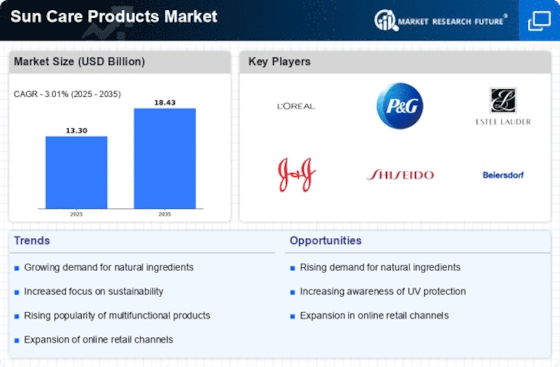Top Industry Leaders in the Sun Care Products Market

Market share analysis in the sun care products segment is influenced by critical factors such as product efficacy, brand reputation, and the ability to provide a diverse range of formulations catering to various skin types and SPF preferences. Pricing strategies play a crucial role, with companies offering sun care products across different price points to address diverse consumer segments. Establishing robust partnerships with retailers and online platforms is vital for market share, ensuring widespread product accessibility and visibility.
While established players dominate the sun care products market, new and emerging companies are entering the space with innovative approaches. These entrants often focus on natural and organic formulations, environmentally friendly packaging, and niche markets to differentiate themselves. The agility of these emerging companies allows them to swiftly adapt to changing consumer preferences, challenging the market dominance of established brands and contributing to the overall diversity of the market.
Industry news within the sun care products market frequently highlights product launches, collaborations, and evolving consumer trends. Companies regularly introduce new formulations, incorporating trending skincare ingredients and addressing specific consumer needs such as water resistance and broad-spectrum protection. Collaborations with dermatologists, skincare professionals, and influencers are common to enhance brand credibility and visibility. Regulatory updates related to sun care product formulations, safety standards, and environmental concerns shape industry dynamics, prompting companies to adapt their practices accordingly.
Current trends in company investments within the sun care products market reflect a notable focus on research and development. Companies allocate resources to develop innovative formulations, explore sustainable and eco-friendly ingredients, and ensure compliance with evolving regulatory standards. Strategic marketing initiatives, including digital advertising and influencer partnerships, are employed to strengthen brand presence and resonate with the target consumer demographic. Investments in eco-friendly packaging solutions align with the growing consumer demand for sustainable and environmentally conscious sun care products.
The overall competitive scenario in the sun care products market remains dynamic, with companies navigating evolving consumer preferences and regulatory landscapes. Established players face the challenge of maintaining trust and relevance in a market where emerging companies are leveraging natural ingredients and sustainable practices to differentiate themselves. The competition is expected to intensify as new entrants gain recognition, introducing innovative formulations and challenging the market share of established brands. In this environment, adaptability, responsiveness to consumer trends, and a commitment to sustainability will be crucial for companies to maintain and enhance their competitive positions in the sun care products market.
Industry News and Investment Landscape:
- Recent purchases, such as Beiersdorf's acquisition of Coola Suncare, point to market consolidation patterns.
- A future-focused approach is indicated by increased research and development efforts that concentrate on sustainable components, creative formulae, and intelligent technology.
- The market demand for efficient sun protection is driven by rising awareness of skin cancer and sun damage thanks to public health campaigns and social media influencers.
Key Companies in the Sun Care Products Market Include –
- Beiersdorf AG
- Johnson and Johnson
- Groupe Clarins
- Coty Inc
- Loreal
- Shiseido Co. Ltd
- Bioderma Laboratories
- The Estee Lauder Companies In
- Unilever











